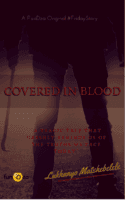My name is Phumlani Qhaga. I grew up in Cape Town’s biggest township – Khayelitsha. I had a brother, Zanoxolo, who was two years older than me. My brother and I were two of the many kids who were raised by single parents in the slums of Site C. But, unlike many other kids, I knew who my father was. He was my hero and role model in those early years of my life: a well-respected policeman and member of our community.
I remember the morning my father came into our bedroom very early. It was too early for us to be awake, and Zanoxolo and I pretended to be asleep. My father kissed our foreheads gently and he didn’t close the bedroom door on his way out. I pulled the curtain open and watched him leave the house with a suitcase and a big bag. Later, I heard my mother crying in their bedroom. Even though we were still young – I was only five at the time – my brother and I could tell something was not right. My father didn’t come home that evening, or the day after.
“When is Father coming back, Mama?” Zanoxolo asked my mother at the end of the second day.
“His captain sent him to Johannesburg to work on a big case. He will come back after the case has been solved,” Mother said. But he didn’t come back and we went on without him.
Zanoxolo excelled academically at primary school and carried his excellent performance to high school.
“Is Zanoxolo Qhaga your brother?” teachers would ask me every time I started a new grade. When I told them that he was, they would go on to tell me what a brilliant student he was, and how they expected me to work hard like him. But I wasn’t as good; I was just an average student who tried his best.
My mother boasted about my brother’s academic success to our family and friends. She told them Zanoxolo was going to be a doctor and buy us a big house in the city one day.
Every year, at our school, there were award ceremonies. My brother had a collection of Top Achiever awards and I had a collection of Cricketer of the Year awards. Cricket was the only thing I excelled at, but my mother hardly mentioned my achievements. In fact, she always told me that if I worked as hard on my school work, I’d be just as good as my brother.
But Zanoxolo was proud of me. He would come to the cricket field after school to watch me practise if he didn’t have an assignment to do, or a test to study for. He always came to watch me when I had big matches – he was my biggest fan. He was the one who first called me Ntini, after Makhaya Ntini. Soon everyone who knew me began calling me Ntini.
When I was in Grade 10, Zanoxolo was in Grade 12. Gang wars were at a peak in Site C at that time. There were funerals almost every month and areas that boys from our neighbourhood could not go to; it didn’t matter whether you were a gangster or not.
I knew boys who joined gangs while they were still in primary school. Many of them died before they reached Grade 9.
Every night, before I slept, I’d listen to my mother pray in her bedroom, “ … and Lord protect my children from violence. Be their shield and guide. Keep them out of gangs. Keep them out of bloodshed. They are my happiness … ”
* * *
Tell us: Children often think a parent prefers their brother or sister. How often do you think this really happens?

